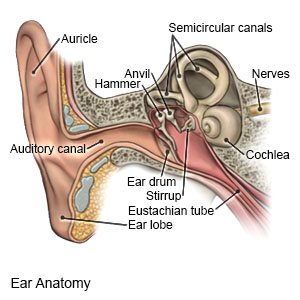Meniere Disease
Medically reviewed by Drugs.com. Last updated on Aug 4, 2025.
Meniere disease is a condition that affects the canals of the inner ear. The inner ear helps you hear and maintain your balance. Too much fluid may be produced, or there may not be enough fluid properly absorbed back into the body. This causes swelling and increased pressure in your inner ear.
 |
WHILE YOU ARE HERE:
Informed consent
is a legal document that explains the tests, treatments, or procedures that you may need. Informed consent means you understand what will be done and can make decisions about what you want. You give your permission when you sign the consent form. You can have someone sign this form for you if you are not able to sign it. You have the right to understand your medical care in words you know. Before you sign the consent form, understand the risks and benefits of what will be done. Make sure all your questions are answered.
An IV
is a small tube placed in your vein that is used to give you medicine or liquids.
Medicines:
- Antibiotics help treat or prevent an infection caused by bacteria.
- Antinausea medicine may be given to calm your stomach and prevent vomiting.
- Antivertigo medicine may be given to help stop your dizziness. This medicine may help you stay calm and relaxed.
- Diuretics decrease extra fluid that collects in your body. Diuretics can remove excess fluid from around your heart or lungs and decrease your blood pressure. You may urinate more often when you take this medicine.
- Steroids may be given to decrease inflammation.
Tests:
- An auditory brainstem response (ABR) test is a series of clicks played through headsets on your ears. A machine is used to measure how your cochlea and nerves react to the clicks.
- Blood tests may be done to give information about your overall health.
- A CT or MRI scan may be taken of your head. You may be given contrast liquid before the pictures are taken to help healthcare providers see your inner ear better. Tell the provider if you have ever had an allergic reaction to contrast liquid. Do not enter the MRI room with anything metal. Metal can cause serious injury. Tell the healthcare provider if you have any metal in or on your body.
- Electronystagmography (ENG) is done to test for problems you may have with balance or dizziness. Sticky pads with wires are placed on the skin around your eyes. The wires are connected to a machine that records information during your ENG. Warm and cool air or water is put into your ears while your eye movements are recorded.
Treatment:
- Surgery to correct ear problems includes removing some bones or cutting a nerve in your inner ear. Excess fluids may also be removed.
- Vestibular and balance rehabilitation therapy (VBRT) is a form of exercise therapy. It may be used to help decrease your dizziness, improve your balance, and prevent injuries.
RISKS:
Medicines used to treat the signs and symptoms of Meniere disease may cause unpleasant effects. These may include a decrease in blood pressure, fast or slow heartbeat, movement problems, or trouble breathing. If left untreated, Meniere disease increases your risk for falls, accidents, or complete hearing loss. Meniere disease may also make it difficult for you to continue your usual activities.
CARE AGREEMENT:
You have the right to help plan your care. Learn about your health condition and how it may be treated. Discuss treatment options with your healthcare providers to decide what care you want to receive. You always have the right to refuse treatment.© Copyright Merative 2025 Information is for End User's use only and may not be sold, redistributed or otherwise used for commercial purposes.
The above information is an educational aid only. It is not intended as medical advice for individual conditions or treatments. Talk to your doctor, nurse or pharmacist before following any medical regimen to see if it is safe and effective for you.
Further information
Always consult your healthcare provider to ensure the information displayed on this page applies to your personal circumstances.
